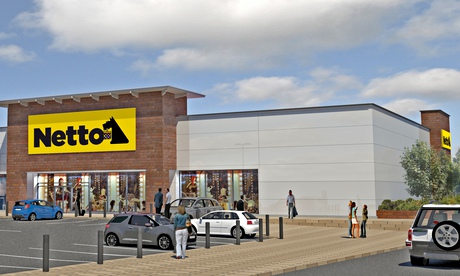Sainsbury does deal with Netto to take
on the discount supermarkets
Netto will open 15 UK
stores by the end of 2015 in partnership with Sainsbury's, which like other
major grocers is suffering from increased price competition

Artist's impression of Netto store (in
partnership with Sainsbury's) Photograph: PR
Sainsbury's is
fighting back against the rise of Aldi and Lidl in a new partnership
with Netto which will see the Danish discount retailer return
to the UK.
Four years after it
sold off nearly 200 stores to Asda, Netto will open 15 UK stores by the end of
2015 with the first five planned for the north of England later this year. The
companies said the partnership would combine Netto's low-cost operations with
Sainsbury's knowledge in UK products and property. If the first batch of
branches trade successfully, Netto stores will open across the country.
The partnership is a
radical move by Sainsbury's to take on Aldi and Lidl, the German discounters
that have eaten into the business of Britain's big foursupermarkets. Sainsbury's
has said repeatedly that it will not join the supermarket price war threatened
by price-cutting campaigns from Morrisons and Tesco, arguing that its superior
values, such as fairtrade bananas, set it apart. Instead, incoming chief
executive Mike Coupe is trying to carve out his own slice of the discount
market.
Coupe, who takes over
from Justin King as Sainbury's boss next month, said: "This joint venture
provides a great opportunity for us to gain exposure to the high growth
discount market for the first time in partnership with [parent company] Dansk
Supermarked, whose expertise and values are a strong complement to our own.
"If successful,
this trial has the potential to open up a new long term growth opportunity for
us complementing our fast expanding convenience, online and non-food
businesses, as well as our existing supermarket estate."
Dave McCarthy, an
analyst at HSBC, said the major grocers were being beaten by discounters and
pound stores because they were failing to invest sufficiently in cutting
prices. He suggested Sainsbury's investment in the discount chain was therefore
misplaced. "Sainsbury's has the attitude 'if you can't beat them join
them', but to us this is a tacit admission its core model can't compete,"
he said.
After the longest
recession since the second world war and years of falling living standards,
British households are shopping around for value and buying more of their basic
goods from Aldi and Lidl. Discounters are expected to see their share of the
grocery market more than triple to about 15% in the next five years as a
result. King has
said the habit is now entrenched and that the supermarkets need
to adapt to the new reality.
Sainsbury's has
survived the march of the discounters better than Tesco and Morrisons but price
competition helped
sales fall for the second straight quarter after nine years of
growth.
Netto struggled to
make its mark in the UK on its last attempt, and in 2010 it
sold its 193 stores to Asda for £778m. Per Bank, the former
Tesco executive who is now head of Dansk, said the new stores would be
completely different from the old format, selling fresh food, Danish breads and
pastries baked at in-house bakeries with 2,100 products compared to just 1,200
before. The stores will also be bigger at just over 1,000 sq metres (11,000 sq
feet) compared with 750 sq m before, enabling Netto to sell non-food goods
including homewares and seasonal specials such as camping equipment.
"The UK discount
sector is growing very rapidly and we believe now is the right time to be
entering the UK market," he said. While Netto came up short against rivals
Aldi and Lidl on it last venture into the UK, Bank said its revamped approach
would be more successful. "We are competing toe-to-toe with (those
discounters) in Poland, Sweden and Germany and we believe we have got a track
record and can come back and make it better this time," he said.
Each company will put
£12.5m into the joint venture. They expect start-up costs to incur a loss of
£5m to £10m each of them in the year to March 2015.
No comments:
Post a Comment